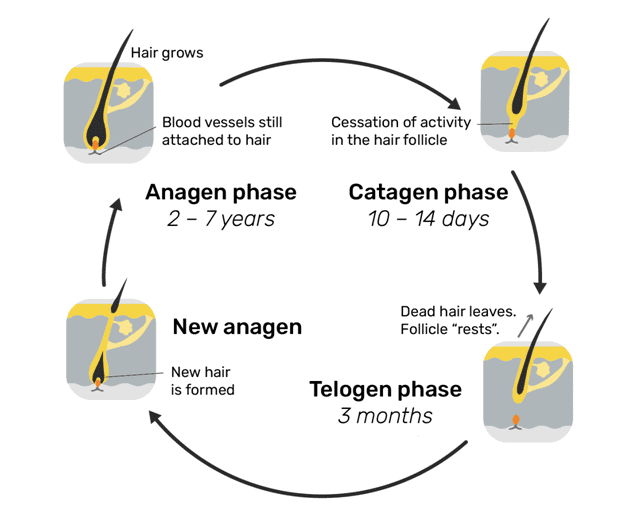Menopause marks a significant milestone in your life, characterized by the end of menstrual cycles and a notable shift in hormonal balance. While it’s widely recognized for symptoms like hot flashes and mood changes, menopause can also cause a range of health conditions that affect every aspect of your well-being—including the health and appearance of your hair – but also, beyond. Understanding the intricate dance between menopause, health, hormones and hair health begins with a basic appreciation of hair biology and the natural growth cycle. This knowledge sets the stage for a deeper exploration of how menopausal changes can lead to conditions like menopause hair loss and thinning hair, and what you can do to manage these challenges.
Understanding Hair Biology and the Growth Cycle
Hair and Scalp Anatomy
A quick run down the hair and scalp anatomy includes understanding key components of a hair follicle. Hair follicle is a complex organ (yes!):

- Hair Follicles: The root of hair growth, nestled in the scalp. Each hair follicle has blood vessels that carry blood and nutrients with oxygen to it. This process is what feeds your hair growth
- Sebaceous Glands: Produce oil to keep hair moisturized. Located along the shaft of the hair, closer to the outer layer of your scalp. Estrogen plays an important role in keeping your scalp moisturised, so functioning of sebaceous glands change as the levels of estrogen drop.
- Hair Shaft: The visible part of the hair. This is the part of your that’s prone to breaking and brittleness without a proper hair care routine. Hair shaft of itself consists of medulla, cortex and hair cuticles
- medulla is the “heart” of the hair shaft
- cortex is the middle layer
- hair cuticles cover the outer layer of your hair. This is the part of the hair that gets most affected by high heat tools, pigments used in hair dye and hair products that you put on your hair
Hair Growth Cycle Stages
- Anagen (Growth Phase): Hair grows actively, lasting several years.
- Catagen (Transition Phase): Growth slows, and the follicle shrinks.
- Telogen (Resting Phase): Hair falls out, making way for new growth.

Hormones and Hair Health
Key hormones that influence your hair health especially around menopause are:
- Estrogen and Progesterone: Both promote healthy hair growth and maintenance.
- Androgens: Higher levels can lead to hair thinning and loss due to androgen receptors around hair root.
- Cortisol: a hormone produced by the adrenal glands that regulates many processes in the body, including metabolism and the immune response, and helps the body respond to stress.
- Insulin: a hormone produced by the pancreas that enables cells to absorb glucose from the bloodstream to be used for energy, playing a critical role in maintaining blood sugar levels.
The interplay between these hormones and the hair growth cycle is crucial for maintaining healthy hair. For example elevated cortisol levels can lead to hair thinning and hair loss by disrupting the normal hair growth cycle and increasing your body’s stress response. Whereas insulin is also not a hormone directly linked to hair, but in cases of insulin resistance (pre-diabetes) associated with higher insulin levels, it can contribute to hair thinning by impacting hormone regulation and potentially worsening conditions like androgenetic alopecia (female pattern hair loss).
Understanding these biological processes can help you identify and address the underlying causes of hair changes, ensuring you take the right steps to care for your hair during this transformative period. But any hair health journey should come with the blood panel and understanding your individual hormonal landscape.
Hormonal Fluctuations and Their Impact on Health
The fluctuation of estrogen and progesterone levels around menopause can lead to a variety of health conditions, that could affect you both, physically and emotionally. These changes begin during perimenopause, the transitional period leading up to menopause, and can persist through menopause and postmenopause. The decline in estrogen and progesterone levels is at the heart of many menopausal symptoms and health concerns.

Vasomotor Symptoms
One of the most immediate and uncomfortable effects of declining estrogen levels is the onset of vasomotor symptoms, including hot flashes and night sweats. These symptoms occur due to the impact of lower estrogen levels on the hypothalamus, the part of the brain that regulates body temperature, causing sudden feelings of warmth and excessive sweating.
Osteoporosis
Estrogen plays a crucial role in maintaining bone density by regulating production and absorption of vitamin D in the gut. As estrogen levels drop during menopause, the rate of bone resorption accelerates, leading to a decrease in bone density and an increased risk of osteoporosis and fractures. This condition is particularly concerning for postmenopausal women, who may experience significant decreases in bone strength and mass.
Cardiovascular Disease
Estrogen is believed to have a protective effect on heart health by promoting flexible arteries and a favorable lipid profile. With the decline in estrogen levels, you might face an increased risk of developing cardiovascular diseases, including heart attack and stroke, due to changes in blood pressure, cholesterol levels, and arterial health. This aspect plays a crucial role in skin & hair health: your scalp needs healthy blood supply to feed your hair follicles.
Urogenital Atrophy
Lower estrogen levels can lead to thinning, drying, and inflammation of the vaginal walls (vaginal atrophy) and the urinary tract, causing discomfort, increased risk of urinary tract infections, and urinary incontinence. But you might wonder why is it related to hair health? These changes can significantly affect your quality of life and sexual health. This aspect is especially important when it concerns the levels of cortisol – stress hormone – in your body. As it may touch upon a very important part of you – your sexuality and the way you feel about yourself and your femininity.

Any concerns in this area should be approach with the utmost care, kindness – and urgency. Because if left untreated, problems can lead to lowering self-esteem, depression and increased levels of cortisol. Increased levels of cortisol over longer periods of time lead to a variety of other health concerns and issues and hair loss & thinning is just one of them.
Mood Fluctuations and Cognitive Changes
The hormonal changes during menopause can also impact mental health, leading to mood swings, depression, and anxiety. Additionally, some women report experiencing memory lapses and decreased concentration, though the direct relationship between these cognitive changes and hormone levels is still under investigation.
There is a tendency to “self-medicate” with alcohol, high sugar foods to help yourself feel better during these fluctuations. However the best way is to approach it holistically, starting from the search of a psychotherapist as well as nourishing community who can support you in these transitional times. You will learn that mood swings are normal as well as learn how to stay kind with yourself and to others when they occur. Focusing on the long term approach, rather than quick fixes will help you deal with the mood fluctuations better.
Changes in Collagen Production
Estrogen is instrumental in maintaining skin health, influencing its thickness, moisture, and elasticity. With reduced estrogen levels, you may notice their skin becomes drier, thinner, and less elastic, raising concerns about your aging appearance. Estrogen participates in the production of collagen in skin, and, since scalp is your skin – it also suffers from breaking down of collagen fibres around your hair follicles.
There is a number of holistic skin care practices that you can employ – and the sooner you start – the higher the outcome of them succeeding. One of them is micro needling or derma rolling your skin and scalp, lymphatic drainage massage for your face and usage of products that protect your skin against UV radiation as well as those containing hyaluronic acid specifically design for mature skin.
-
Derma Stamp for Hair Growth$19.59
Menopause Hair Loss and Thinning Hair
The phenomenon of hair thinning and loss during menopause, often referred to as menopause hair loss, can be distressing. It’s not just about losing hair; it’s about losing a part of what many feel contributes to their femininity and identity. This condition is primarily attributed to the hormonal upheavals of menopause but is often exacerbated by other factors, including stress, nutritional deficiencies, and other menopause-related health conditions like thyroid imbalances.
One critical aspect of menopause-related hair loss is the increased relative influence of androgens, the male hormones that all women produce in small amounts. With the decline in estrogen and progesterone, the effects of androgens on the hair follicle become more pronounced, leading to a pattern of hair loss known as androgenetic alopecia. This type of hair loss is characterized by a gradual thinning of hair on the crown and frontal scalp, and while it’s more commonly associated with men, it affects a significant number of menopausal women.
Thyroid Changes During Menopause
The transition into menopause can significantly impact thyroid function, a link that underscores the intricate balance between hormones in the female body. The thyroid gland, responsible for regulating metabolism, energy production, and a host of other bodily functions, can become more susceptible to dysfunction during menopause. This susceptibility arises as the body’s hormonal landscape shifts, particularly due to fluctuations in estrogen and progesterone levels, which can indirectly influence thyroid hormone production and metabolism.

Hair health and thyroid hormone
Thyroid dysfunction during menopause, manifesting primarily as hypothyroidism (low thyroid function) or less commonly as hyperthyroidism (overactive thyroid), can have profound effects on overall health, including hair health. Hypothyroidism, for example, can lead to hair loss and this occurs because thyroid hormones are crucial for the development and maintenance of the hair follicle. When thyroid hormone levels are low, it can disrupt the hair growth cycle, leading to hair weakening, thinning, and increased shedding. The changes in hair texture and density can significantly affect your self-esteem and perception of your appearance.
In addition, a malfunctioning thyroid can lead to other, more insidious health issues: mood swings, fatigue, irritability, constipation, weight gain – to name a few… And those would have an even more pervasive impact on your life, especially if you’re dealing with them “in the dark” – i.e. without a proper blood panel analysis and without knowing exactly how severe the problem is.
Given the potential for thyroid dysfunction to exacerbate or mimic menopausal symptoms, monitoring thyroid levels during this period should be your priority. Regular thyroid function tests can help in the early detection and management of thyroid imbalances, allowing for timely interventions that can mitigate symptoms, including those related to hair loss. Addressing thyroid health is a critical component of managing transition to menopause effectively. Ensuring thyroid hormone levels are balanced not only supports overall well-being but also helps maintain healthy hair growth, texture, and density, contributing to an overall quality of life during and after the menopause transition.

Common treatments for health conditions linked to menopause
Treating health conditions during menopause requires a holistic approach that addresses not just the symptoms but also the underlying causes. Below is an overview how to treat them holistically:
Importance of Continuous Monitoring by Blood Panel
Regular monitoring of hormone levels through blood tests is crucial during menopause. A comprehensive blood panel can provide insights into thyroid function, blood sugar levels, lipid profiles, and the levels of reproductive hormones. Continuous monitoring allows for early detection of imbalances or health issues, such as thyroid dysfunction or insulin resistance, enabling timely and targeted interventions. Discuss with your healthcare provider the frequency and scope of these tests to ensure they align with your health status and symptoms.
Right Nutrition
Nutrition plays a pivotal role in managing menopausal symptoms and supporting overall health. A diet rich in fruits, vegetables, whole grains, lean proteins, and healthy fats can help manage weight, reduce hot flashes, and support bone health. Foods high in calcium and vitamin D are particularly important for preventing osteoporosis. Additionally, incorporating foods with phytoestrogens, such as soy products, may help balance hormones. Limiting caffeine, alcohol, and spicy foods can also alleviate vasomotor symptoms. Consider consulting a nutritionist for personalized dietary advice tailored to your health needs.
Lifestyle Changes: Exercise
Regular physical activity is beneficial for managing menopausal symptoms and improving health outcomes. Exercise helps in weight management, reduces the risk of osteoporosis and cardiovascular disease, and can alleviate depression and anxiety. Aim for a mix of cardiovascular exercises, strength training, and flexibility exercises. Activities like walking, swimming, yoga, and Pilates can be particularly effective and enjoyable.
Our hair growth calendar guides you back to your hair health by helping you focus on your overall health. It includes guidance on subtle lifestyle shifts, nutrition and mindfulness:
Mindfulness Practice
Mindfulness and meditation can significantly reduce menopausal symptoms by lowering stress levels, improving mood, and enhancing overall well-being. Practices such as mindful breathing, meditation, and yoga promote relaxation and help manage stress, anxiety, and depression. Even a few minutes of mindfulness practice each day can have a positive impact on your health.
Psychotherapy and Importance of a Nurturing Community
Menopause can be a challenging and disorienting period emotionally and psychologically. Seeking support from a psychotherapist or counselor can provide strategies to cope with changes and improve mental and emotional health. Psychotherapy is increasingly becoming an acceptable norm to deal with anxiety, depression, or mood swings amongst women going through menopause.
Being part of a supportive community, whether it’s a menopause support group, friends, or family, can provide emotional comfort and practical advice. Sharing experiences and strategies with others who are going through similar changes can be incredibly reassuring and empowering.
Implementing these recommendations can help mitigate menopausal symptoms and support a healthier transition through menopause. It’s important to work closely with healthcare providers to develop a personalized plan that addresses your specific needs and health goals.
Sources:
Sleep problems during the menopausal transition: prevalence, impact, and management challenges. Nature and Science of Sleep, 10, 73 – 95. (1)
Levin, V., Jiang, X., & Kagan, R. (2018). Estrogen therapy for osteoporosis in the modern era. Osteoporosis International, 29, 1049-1055 (2)
Llaneza, P., García-Portilla, M., Llaneza-Suárez, D., Armott, B., & Pérez-López, F. (2012). Depressive disorders and the menopause transition.. Maturitas, 71 2, 120-30 (3)
Who we are:
The Hair Fuel is an all-natural hair growth mask created by Laura Sagen, who lost a third of her hair after a terrible visit to a hairdresser while suffering from a life-long condition of PCOS associated with androgenic hair thinning. She developed the formulation rooted in the science of scalp blood flow, which has become The Hair Fuel growth mask. Since then, her company has helped thousands of people like you to start growing healthy hair.
We work closely with our lab and manufacturers to ensure the highest quality product. But a product alone is never enough – so we hold your hand throughout your own, unique hair growth journey. Our flagship product, The Hair Fuel mask coupled with tailored advice, digital tools, and online support is there to help you grow the best hair you can. It’s a big claim – but we’re unafraid to make it. Check out our starter bundles >>

